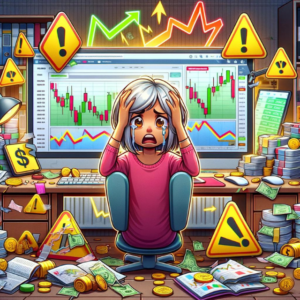How to Set Goals for Your Forex Trading
Participating in the Forex market allows you to exchange national currencies in a global marketplace. The forex market is the largest and most liquid asset market in the world. Before hopping into the Forex trading world for beginners, ensure you have clear goals and a plan. Consider putting together a plan that includes the trading system you want to use, your market analysis, risk management steps, and personal goals. Keep in mind that you win with skills, not luck. So, here are ways to learn Forex trading and to set trading goals effectively.
Focus on a Strategy
Consistency in your trading can be extremely beneficial. You learn consistency when you hone in on one particular strategy, learn and master it, and regularly put it into practice. Consistency is an important habit to build, but it’s incredibly important – especially as a newbie trader.
One of the most challenging part of trading for many is focusing on the niche or trading pairs you’re most interested in. Many tend to get sidetracked with other trades or new strategies. Instead, focus on one strategy, stick to it through the ups and the downs, and learn how to master it.
Journal Daily
Without a track record, it’s difficult to pinpoint what you need to do to improve your trades and advance your profits. One of the best ways to keep a record is to journal about your trades. However, without consistency in your journaling, you’re going to have an incomplete picture of what actually happened.
You may find it easier to journal after certain types of trading days. For example, when you’ve had a difficult day and are frustrated, journaling to relieve the stress makes sense. However, it’s important to track or journal about your trades whether they are good or bad. This allows you to analyze and review your personal growth, review personal trends, and take stock of how different moods or events in your life affect your trades.
Keep in mind that journaling can look different for different traders. You can keep a full journal where you lay out the events of the day, including your trades, wins, and losses. Another option is to keep a scoreboard specifically to track your trades. You can even keep a spreadsheet that tracks your trades and includes notes that you think may be relevant to review in the future.
Journaling about your trades is a good way to start when you’re trying to set goals for your Forex trading. After reviewing your journal and utilising a Forex profit calculator, you can set realistic goals for the trades and profits you’d like to see.
Scope the Charts Daily
Another step you can take to help you create effective goals is checking the trading charts daily. These charts allow you to see the latest price changes in the market. When looking at the different charts, there are a number of data points and information you can analyse including:
- Trends in the market
- Volume pattern
- Key resistance and support areas
- Catalyst events
When you’re making your Forex trading goals, one of the first goals you might want to make is to regularly view and analyse the charts. In fact, this is one of the most important habits and goals of top traders. Whether you’re learning Forex trading for beginners or you’re an experienced trader, these daily charts help you improve your trading.
Setting “SMART” Goals
When you’re setting a goal, whether for trading or anything else, consider SMART goals. “SMART” is an acronym that stands for:
- Specific
- Measurable
- Attainable
- Relevant
- Time-bound
Setting SMART goals makes Forex trading for beginners a lot simpler because your goals are laid out in a way that makes sense and can help improve your trading.
First, start with a specific goal. A specific goal gives you a clear direction for what you’re trying to achieve. Write down this specific goal and consider including additional information, such as who must be involved to help you achieve the goal, what resources you already have or may need to obtain, and what limitations you might have in achieving the goal.
Next, think about if your goal is measurable. A measurable goal is crucial because you want to monitor your progress throughout the process and adjust accordingly to help you stay on track. A SMART goal should include specific criteria that allow you to track and measure your progress. Daily journaling becomes valuable when creating a measurable goal because having something tangible to refer to gives you a clear sense of direction and progress.
When creating a goal, it’s crucial to evaluate whether or not the goal is achievable. There are a number of reasons to ensure that the goal is achievable. Having an achievable goal helps keep your morale up, allows you to keep working toward the goal, and gives you a sense of accomplishment when you achieve it. Ask yourself how the goal can be accomplished and how realistic it is for you to achieve it. For example, with a starting balance of $3,000, it may not be best to set a target of $3,000,000. A more realistic goal might be $4,000 or $6,000.
Next, your goals need to be relevant. It’s important to set goals that are related to what you’re doing and where you want to be in the future. When evaluating if your goal is relevant, make sure that you also ensure that it aligns with your personal ethics. While the goal may be relevant to your long-term objectives, if it’s not something that is relevant to you, it should be re-evaluated.
Lastly, create a time-bound goal. When creating a time-bound goal, you include a timeframe for you to achieve the goal. This can also be broken down to include various timeframes for smaller sub-goals that help you get to the overall goal. When creating a timeframe, make sure that it is realistic and achievable, as well. For example, if you want to gain a 200% profit, consider whether this is realistic in a day before setting that as the timeframe you want.
After Creating the Goal
Tracking your progress is just as or even more important than setting goals. This kind of accountability will keep you moving forward and help you indicate parts of the process that need to be evaluated and revised. It’s far too easy to lose focus on your goal when it’s not on your mind, when you have no idea if you’ve made progress, or when you don’t have smaller tasks that help you work your way towards that end goal.
A trading checklist, a task list, or a planner of minor goals that help you achieve the bigger goal sets you up for long-term success. These tools can help keep you on track and actively show where you might need to make adjustments and the progress that you’ve made toward your goal.
Conclusion
Forex trading for beginners may seem daunting at first. However, with the right help, guidance, and information, trading can change your life. Creating practical goals for Forex trading requires planning and a clear purpose and direction. Make sure your trading goals are specific, measurable, achievable, relevant, and time-bound.
Forex training education and programs help beginners navigate their way more smoothly. First, learn forex trading for beginners by signing up with reliable and experienced mentors through a Forex academy or training course. Then, design your ideal trading plan with the help of Guerrilla Trading today.






